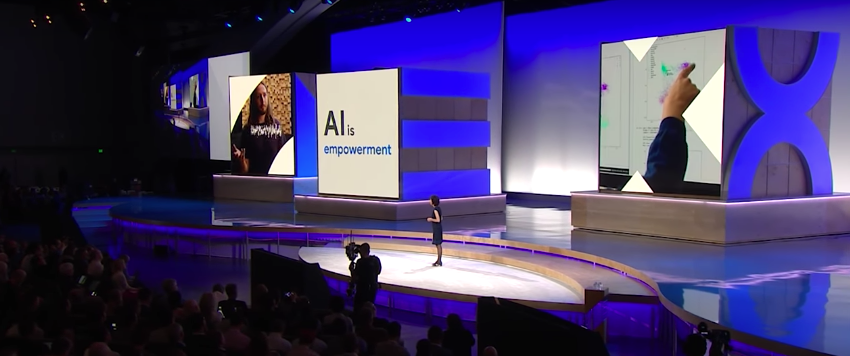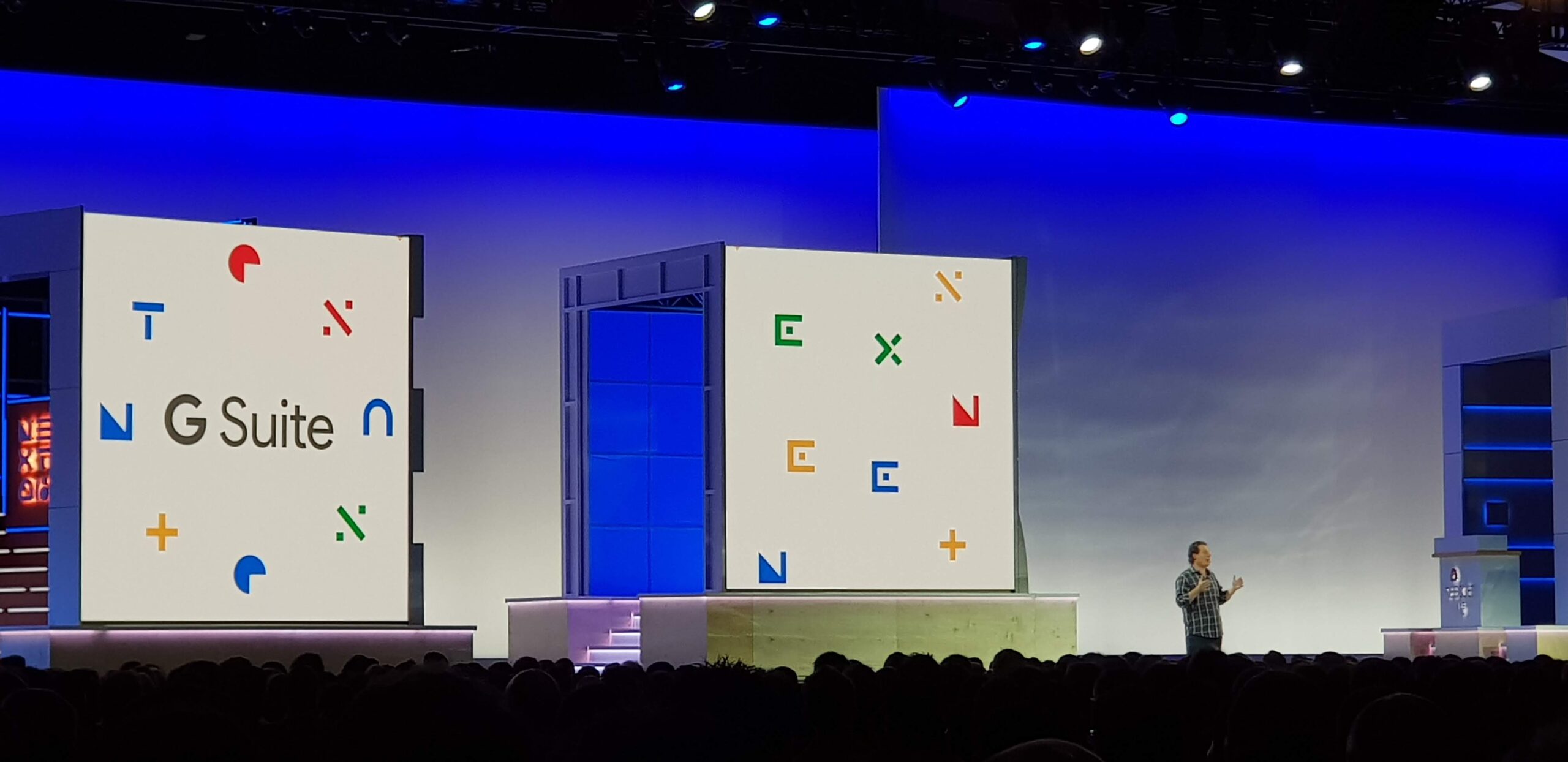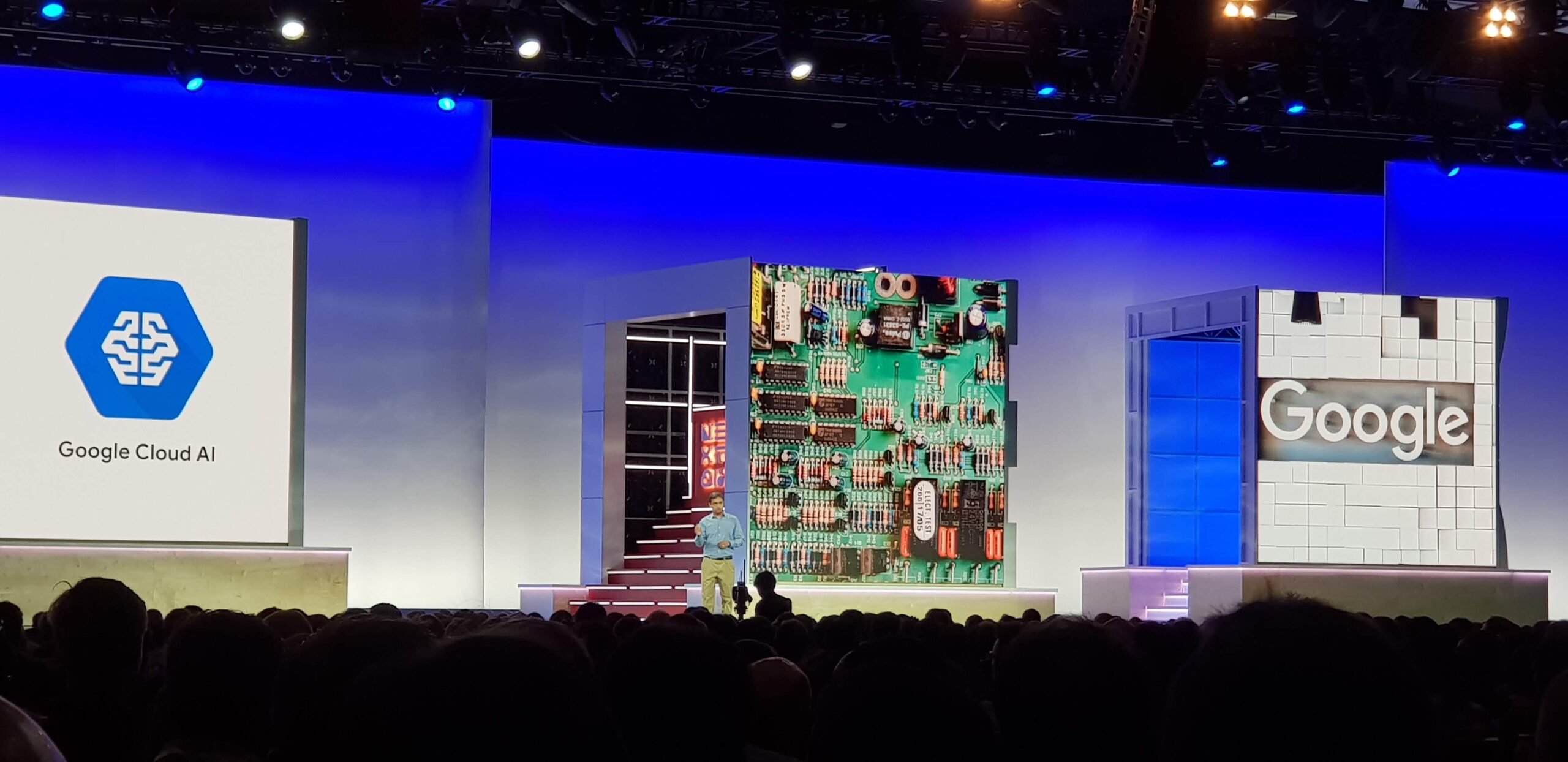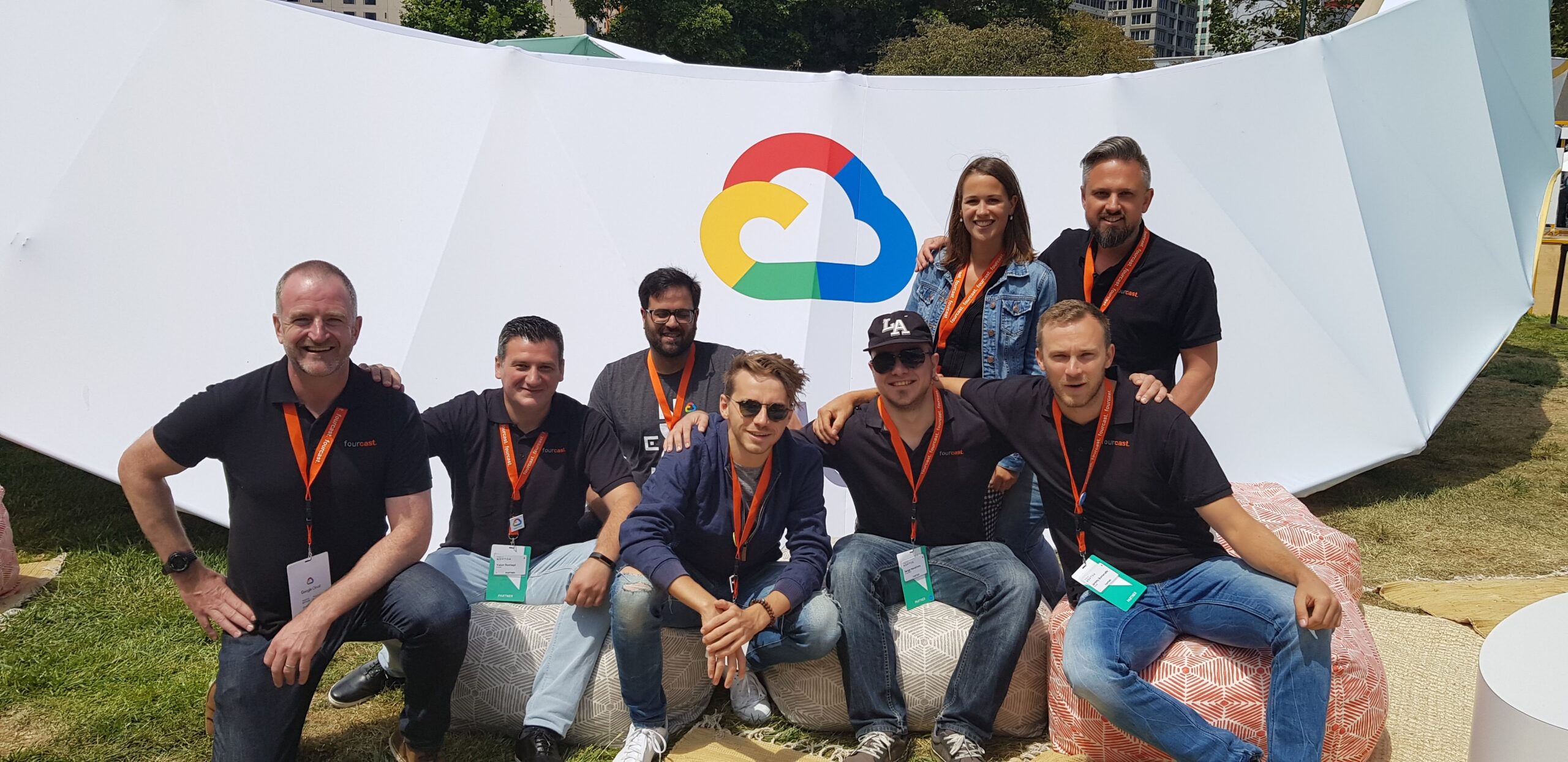Whether you’re an IT business leader looking to innovate, a Google partner, developer, data scientist, G Suite user or seasoned Google Cloud fan; the announcements made at this year’s edition of Google Cloud Next ‘18 are exciting and promising.
For those who don’t know Google Cloud Next, it’s a yearly returning conference that Google organises and where customers, partners, developers, influencers and the greater global cloud community get inspired and learn. Just like the Cloud, it’s getting bigger every year. Proof of that: this year’s edition is the biggest Google event ever, with over 20 000 participants joining from all over the world.
Traditionally, Next is also the right place and time for the tech giant to announce what it’s been up to and what it’s having in mind for the future of Google Cloud. If you’re already a G Suite or Google Cloud Platform customer, you’ll be looking forward to use the improvements and new features that were announced. If you’re not a G Suite or Cloud user yet, these updates are likely to convince you to make the move to Google Cloud and start driving innovation in your business.
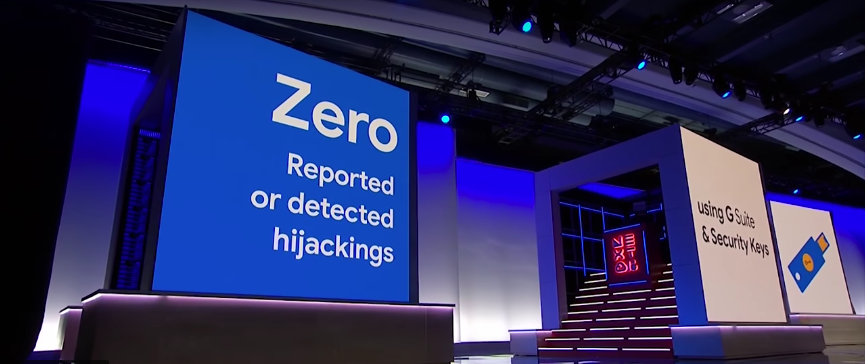
Overall, Google clearly sees Artificial Intelligence and Machine Learning as the opportunity drivers. Secondly, a major concern that Google wants to keep addressing and improving in all Cloud technologies, is security. It’s both what Google is already strong at, and at the same time what will be heavily worked on and invested in. This will without a doubt continuously push forward the already amazing possibilities of all Google Cloud technologies.
“Today, AI is built into everything we do at Google. From our data center energy usage to BigQuery to Gmail, AI is applied throughout our business. Now we are working to make it easy for you to incorporate the power of AI into what you do. In the last year we introduced automated machine learning model generation, AutoML, and we are announcing new versions today.” – Diane Greene, CEO of Google Cloud
Here is an overview of some exciting news, as shared by Google at Google Cloud Next ‘18 in San Francisco, 24-26th of July 2018.
G Suite Upgrades
“Let machines do the mundane work” is the lemma of the ‘new G Suite’, as Google calls it. Powered by Google’s AI capabilities, these new possibilities for G Suite were announced at Google Next ’18:
- A new investigation tool in the Security Center, which gives admins advanced and easy control over potentially infected files and emails.
- With Data Regions for G Suite, you can now choose where you want to store primary data for select G Suite apps: globally, in Europe, distributed or in the US.
- In Hangouts Chat, you will be able to use Smart Reply. This uses AI to recognise which messages need responses, and proposes appropriate reply options.
- With Smart Compose in Gmail your emails will be able to get intelligently autocompleted. It can f. ex. fill in greetings or common phrases & more (available in the coming weeks).
- In Google Docs, Grammar Suggestions will recognise grammatical errors & suggest corrections, using a unique machine translation-based approach (available in an Early Adopter Program).
- In Hangouts Meet hardware, voice commands (also used by Google Assistant) will be possible, so that teams can connect to video meetings quickly (available to select Meet hardware customers later this year).
- New features in the new Gmail: redesigned security warnings, snooze and offline access (now generally available to G Suite users).
- Possibility to securely index third-party data beyond G Suite in Cloud Search, whether the data is stored in the cloud or on-premises (available to an initial set of customers).
- With the enterprise version of Google Voice, admins can manage users, provision and port phone numbers, access detailed reports & more (available in an Early Adopter Program).
- A new Drive Enterprise can be adopted as a stand-alone, which enables companies to seemlessly transition data from legacy enterprise content management (ECM) systems (generally available today).
- G Suite Enterprise for Education, with additional enterprise-grade capabilities designed for large institutions & customised for education will be available in 16 new countries (note: not yet in Belgium).
More info about the new G Suite in this article.
Supercharged Machine Learning & AI for every business
“AI is empowerment, and we want to democratise that power for everyone and every business—from retail to agriculture, education to healthcare. AI is no longer a niche in the tech world—it’s the differentiator for businesses in every industry. And we’re committed to delivering the tools that will revolutionise them.” – Fei Fei Li, Chief Scientist of Google AI
- Developers can rely on Cloud AutoML Vision, Natural Language & Translation to recognise new categories of images, text & language. This way Google extends powerful ML models to suit specific needs, without requiring any specialised knowledge in machine learning or coding (available in beta).
- Cloud TPU Pods and TPU v3s, custom ASIC chips designed for machine learning workloads, are in alpha. They allow you to train models faster on Cloud ML engine.
- You can build smarter, more conversational interfaces with new improvements to Dialogflow Enterprise Edition.
- Contact Center AI is a brand new solution which includes new Dialogflow features and other tools to help live contact center agents & perform analytics.
- Google now supports training & online prediction in Cloud ML Engine, through scikit-learn & XGBoost.
- Kubeflow v0.2, a machine learning toolkit for Kubernetes, makes it easier to use ML software stacks on Kubernetes.
- Enterprises can extract info that is difficult to find in their stored documents, thanks to a partnership with Iron Mountain.
- A tiny ASIC chip called Edge TPU is designed to run TensorFlow Lite ML models at the edge (Injong Rhee demonstrated in his keynote that 4 of them fit in one penny).
- The powerful AI capability of Cloud IoT Edge is extended to gateways and connected devices.
Building a better Cloud
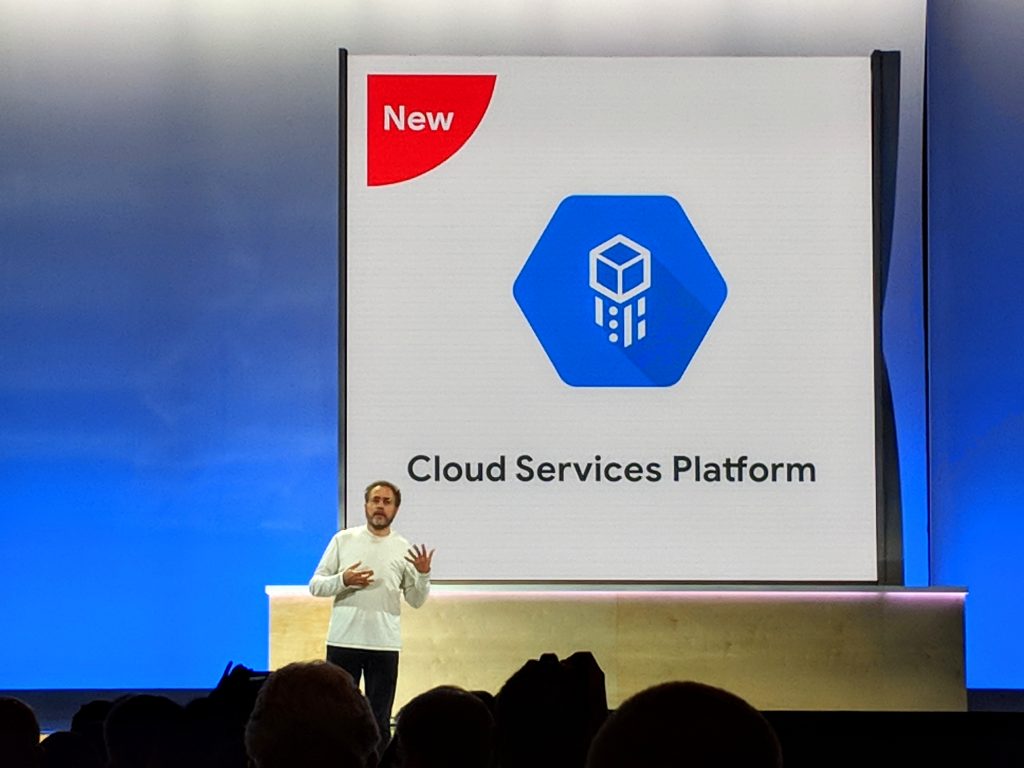
“Cloud Services Platform puts all your IT resources into a consistent development, management and control framework, automating away low-value and insecure tasks across your on-premise and Google Cloud infrastructure.” – Urs Hölzle, Google’s vice president of technical infrastructure
Exciting times also for Cloud infrastructure. With the launch of a new Cloud Services Platform, a family of cloud services, Google wants to improve speed, reliability, security and governance. All that while automating away low-value and insecure tasks across your on-premise and Google Cloud infrastructure.
Here is what’s new for this Cloud Platform:
- A service mesh based on the open-source Istio, which will soon move to version 1.0, and Managed Istio, a fully managed version thereof, running in GCP. Enterprises canoperationalisemicroservices created by the Istio service mesh with their existing API management tools with Apigee API Management for Istio.
- The new Stackdriver Service Monitoring for Istio and App Engine workloads allows you to see how your end users experience your systems.
- GKE On-Prem advances hybrid computing. This Google-configured version of Kubernetes includes multi-cluster management, to be deployed on-premise or in other clouds.
- A single source of truth for the policies that govern your Kubernetes workloads with GKE Policy Management. Across any enrolled cluster.
- The new GKE will be offered as a serverless add-on, so you can build all your applications serverlessly even if you use Kubernetes. This is releasedas open-source under the name Knative.
- Google adds support for Python 3.7 & PHP 7.2 runtimes on App Engine standard environment.
- Cloud Functions is now generally available, with support for additional languages, plus performance, networking and security features.
- You can run container-based workloads in a fully managed environment and still only pay for what you use, thanks to Serverless containers on Cloud Functions.
- Store, query and sync your cloud-native app data at global scale with Cloud Firestore. Soon it will support Datastore Mode with better app performance & strong consistency (access within the GCP Console coming soon).
- Cloud Build is Google’s new continuous integration/continuous delivery (CI/CD) service. It comes integrated with popular developer tools & lets you build and test serverless applications in the cloud, at scale.
![]()
Google Cloud Platform (GCP) also gets other improvements to make it even easier to build applications as you like it, with expanded database options and features that bring flexibility and performance. Now, you can run more types of workloads than before on GCP, thanks to:
- Partnerships with managed service providers (MSPs) enable you to run Oracle workloads on GCP using dedicated hardware.
- A new Intel and SAP collaboration means you’ll be able to run SAP HANA workloads on Compute Engine VMs powered by Intel Optane DC Persistent Memory. This will bring more capacity at a lower cost.
- Regional replication across zones is now available for Cloud Bigtable, Google’s massively scalable NoSQL database. Also available is the beta version of Key Visualizer for Cloud Bigtable, which helps debug performance issues by mapping key access patterns.
- Cloud Build now integrates with GitHub, making it easy to add CI processes on top of your GitHub code repository.
Data Analytics Upgrades
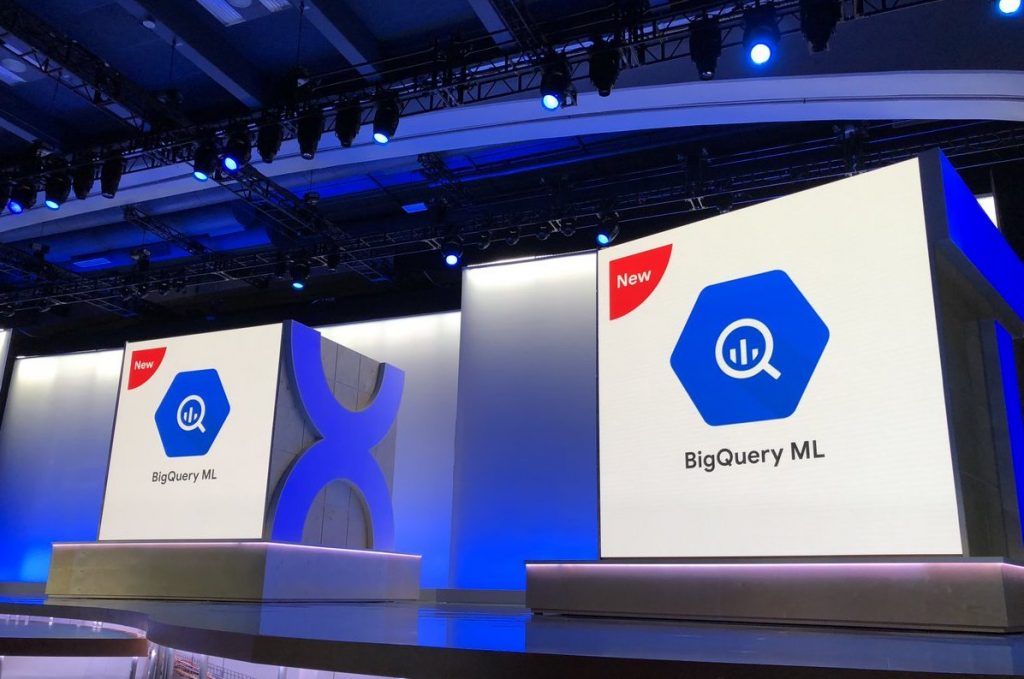
Data scientists, analysts and developers will be happy with the following announcements in the Google data analytics technology:
- BigQuery ML makes machine learning accessible to all. It allows data analysts and data scientists to easily build machine learning models directly from BigQuery with simple SQL commands (available in beta).
- BigQuery Clustering enables you to group rows by common keys for faster query speeds.
- BigQuery GIS lets you manage geographic data types (available in public alpha).
- A Sheets data connector for BigQuery enables you to access your BigQuery data warehouse straight from Sheets (available in beta).
- Data Studio Explorer supports templates and a one-click visualisation tool (available in beta).
- Cloud Composer, a managed Apache Airflow service helps you orchestrate your multi-cloud deployment strategy (now available).
- Customer Managed Encryption Keys for Dataproc gives you granular control over provisioning and revoking identity-aware authentication keys to your teams and users (available for BigQuery & in beta for Compute Engine and Cloud Storage).
- Streaming analytics updates, including Dataflow Streaming Engine (beta) & Python support (available).
- Dataflow Shuffle helps customers run bigger and faster batch jobs (available).
- Dataproc Autoscaling gives users Hadoop and Spark clusters that scale automatically, and Dataproc Custom Packages allows customers to deploy a selection of top-level Apache components quickly through a checkbox-like selection experience within Dataproc (both in alpha).
Security-specific announcements

Security is something that is constantly being optimised by Google across all its products. In addition to that, these are some other new security upgrades:
- Control access based on user’s identity, location, and the context of their request with Context-aware access.
- The Titan Security Key, a FIDO security key with firmware developed by Google to verify its integrity helps to protect high-value users like admins.
- Shielded VMs let you ensure that your virtual machines have not been tampered with or compromised.
- Enforce signature validation when deploying container images with Binary Authorization.
- Container Registry Vulnerability Scanning helps prevent images that contain vulnerabilities from being deployed.
- Geo-based access control in Cloud Armor, Google’s DDoS and application defense service. Allows you to control access to your services based on the location of the client trying to connect to your application.
- Protect your most sensitive workloads without needing to manage a hardware security module (HSM) cluster, with the fully managed service Cloud HSM
- Access Transparency provides an audit trail of actions taken by Google Support and Engineering when they interact with your data and system configurations on Google Cloud (now available).
See you next year!
“So, as companies move everything to the cloud, why are they choosing Google? … Google’s business is information, and thus Google Cloud was built to efficiently take in information, organise it, and give back intelligence. This is what every company needs in order to drive their business—supercharged information.” – Diane Greene, CEO of Google Cloud
Our team was thrilled to attend Google Next ’18 and returns to the Fourcast headquarter in Belgium full of inspiration and even more enthusiasm to put into practice all the gained knowledge. We engage ourselves to make optimal use of these upgrades wherever we can. All to help our customers better and get the most out of Google Cloud technologies for them every day. And of course, we’re already excited to see what’s next for the Cloud. We’ll be back at Next ’19, that’s for sure!
What about you?
Want help with your IT projects? Want to get started with Google Cloud, but you don’t know where to start? Looking for a Google partner that can help you with your next Cloud project?
